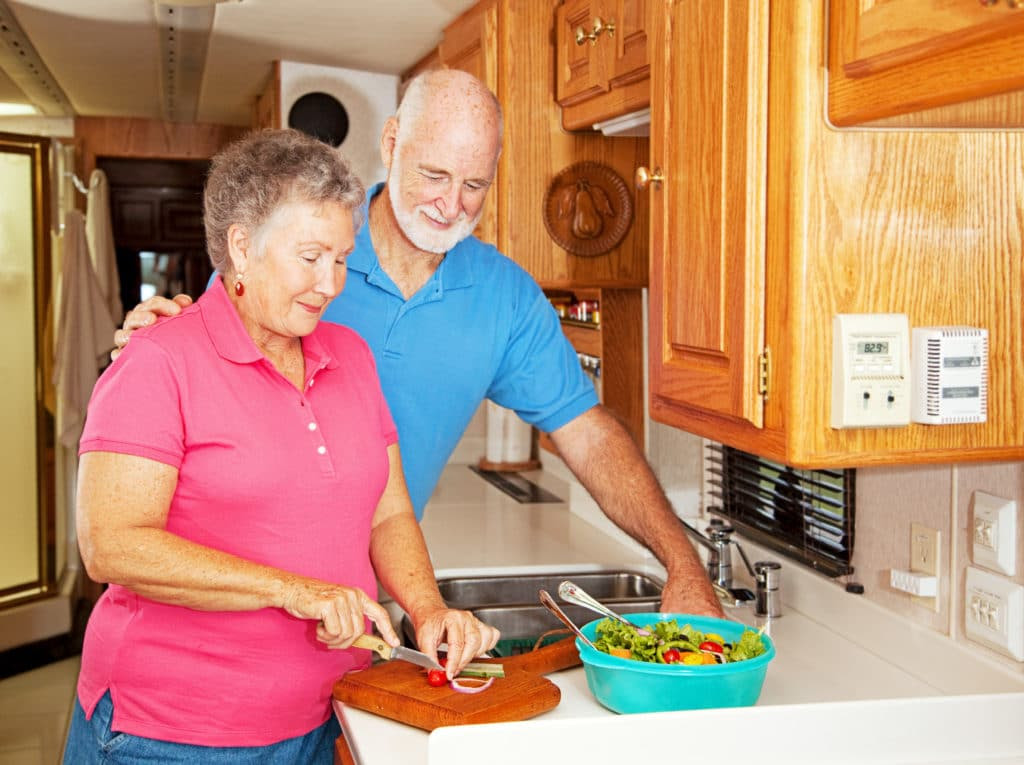The holidays are a great time to check in on how your senior relatives are doing. How is their health? How are they getting around? Are there a lot of obstacles in the way? If you are concerned by any of the answers to these questions, then you should look to see if there are any solutions available to make their lives more livable.
One of the most obvious signs of ill health is weight loss. Possible causes could include cancer, dementia or depression. Seniors may also experience lower energy levels or fatigue, which can make it challenging to shop for and prepare nutritious meals and then clean up afterwards.
Pay close attention to the way your loved one moves and how they walk. A reluctance to walk, changes in gait or obvious pain during movement can be a sign of joint, muscle or neurological problems. If your loved one is unsteady on their feet, they may be at risk of falling. Getting a medical alert device could help greatly reduce the risk of a life threatening fall.
Keep an eye out for changes in your loved one’s moods and behavior. You can’t always tell someone’s emotional state over the telephone, especially if you speak daily. Look for signs of depression and anxiety, which include withdrawal from social activities, changes in sleep patterns, loss of interest in hobbies, and changes in basic home maintenance, and lack of personal hygiene. The latter can be an indicator of cognitive decline or other physical ailments like dehydration, which often happens to elders in the winter months.
Pay attention to your senior’s surroundings. For instance, if your loved one is usually tidy and pays bills promptly, but you discover clutter and stacks of unopened mail while visiting, these indicate a problem. Take a walkthrough of their home while you’re visiting to see if they are keeping the house to their usual standards.
The holidays are a great time to check in on all of these things, as it can make it easier to think back and compare how your family member was last holiday season.
Holiday Safety Tips to Keep in Mind
COVID Considerations
Practice Food Safety
Good food is one of the most anticipated parts of the holiday. Keep in mind some important food safety tips:
- Always wash your hands before cooking and eating. This helps prevent the spread of germs and keeps everyone healthy.
- Be aware of everyone’s allergies when cooking or ordering.
- Don’t walk away from the stove when cooking. This can be a potential fire hazard and is dangerous for curious little ones and pets.
- Remember to cook food to the proper temperature. Overcooked food can mean a dry meal, but undercooked food may mean a trip to the hospital. Undercooked food may contain bacteria causing a case of food poisoning. Use a thermometer when cooking and look up correct temperatures if necessary.
- Finally, no matter how tempting it may be, stay away from the raw dough. Eating or tasting raw dough can lead to illnesses that aren’t worth the risk.
Manage Stress
Having so much to do during the holidays can become very stressful. Try not to put too much pressure on yourself or your senior loved ones. Doing everything yourself can take the fun out of the holidays, so ask for some help. Share responsibilities such as decorating, cooking, baking, and wrapping with others to alleviate the stress. Long trips to holiday parties may not be an option anymore. As your loved one ages, getting in and out of the car may get too difficult and sitting for long periods of time may get uncomfortable. To accommodate them and relieve stress, host celebrations closer to their home. Also, keep in mind your loved one’s schedule since it can be stressful switching up sleeping or eating times.
COVID-19 has now added even another stress factor. Some information and resources for caregivers to help cope can be found here: www.caregiving.org/resources/covid-19-resources-for-families/
Eat Healthy
As hard as it may be, keeping health in mind during the holidays is essential. Moderation is the key to maintaining your health, even during the holidays. Avoid chicken or turkey skin to lower your calorie and fat intake. White meat without skin is the healthiest option and may allow you to have an extra cookie for dessert. When it comes to dessert, incorporating fruit makes for a healthy and tasty option. Fruits pair well with most desserts and assure that you are making a healthier choice.
Alcohol Safety
It is safe to say many of us have probably increased our alcohol consumption in light of recent events. Although Alcohol safety is important all year long, it tends to get pushed to the side during holiday celebrations.
Remember to consider medications before your loved one has any alcoholic drinks. Many medications cannot be taken with alcohol and can cause negative side effects.
Be aware of “holiday heart syndrome” for those senior family members that don’t drink often. This occurs when someone who doesn’t consume alcohol often, drinks too much during a short time. It results in an irregular heartbeat, dizziness, or even death. To avoid this, drink safely or not at all.
Celebrating the holidays with loved ones should be an enjoyable and stress-free experience. Remember to use this time to check up on your senior loved ones to determine if they need extra assistance.













